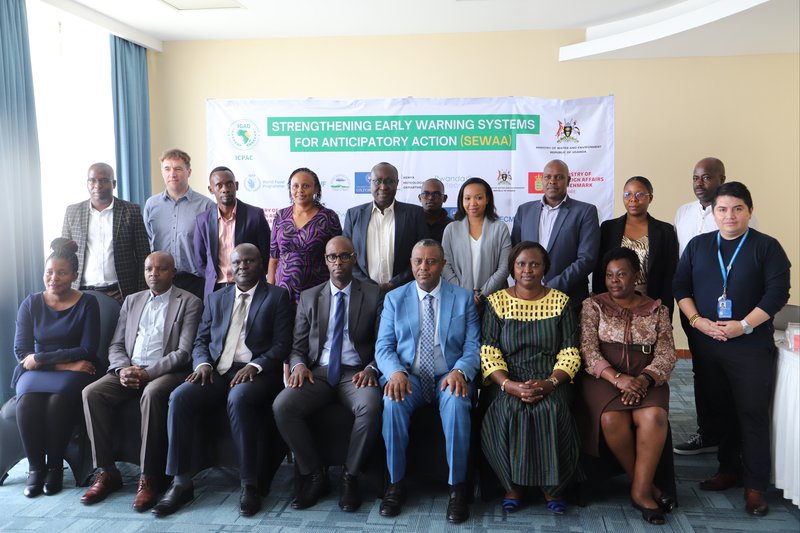SEWAA Project Expands to Uganda and Rwanda to Strengthen Climate Resilience

3rd March 2025, Entebbe, Uganda: The IGAD Climate Prediction and Applications Centre (ICPAC), in collaboration with partners, launched the expansion of the Strengthening Early Warning Systems for Anticipatory Action (SEWAA) project to Uganda and Rwanda. This milestone marks a significant advancement in enhancing climate resilience and disaster preparedness in Eastern Africa. The project’s expansion, supported by the government of Denmark, and in partnership with the World Food Programme (WFP) builds on its successes in the ongoing pilot countries of Kenya and Ethiopia, where Machine Learning (ML) and Artificial Intelligence (AI) are being leveraged to improve forecasting, early warning systems and anticipatory action.
As Eastern Africa experiences increasingly frequent and severe climate-related disasters, the expansion of SEWAA into the focus countries of Uganda and Rwanda presents a critical step towards strengthening climate forecasting and enhancing anticipatory action in Eastern Africa. By integrating advanced climate technologies, including AI-driven solutions, into national forecasting systems, the project will improve the accuracy of early warning systems, enabling governments, development and humanitarian agencies to act before disasters strike.
This proactive approach seeks to significantly reduce the loss of lives and livelihoods caused by extreme weather events such as droughts and floods which are prone in the region. In addition, SEWAA’s expansion to other IGAD member states will foster collaboration between regional and national institutions, ensuring that early warning systems are inclusive, aligned, and responsive to each country’s unique climate challenges. This will equip communities and decision-makers with the knowledge to make informed choices that support sustainable development.
“The IGAD region is one that is most vulnerable to climate change impacts, with extreme weather events such as droughts and floods becoming more frequent and severe. SEWAA ‘s inception to Uganda and Rwanda marks a significant milestone in strengthening our collective ability to anticipate and respond to climate shocks before they escalate into disasters, but also a strong message on our strategic partnership withWFP, which has been at the forefront of coordinating the innovation. This initiative reinforces the importance of IGAD ’s regional cooperation in building resilience and safeguarding lives and livelihoods. By leveraging AI-driven solutions, the project will empower governments, and institutions with the information needed to make proactive decisions and enhance disaster preparedness across the region,” noted Dr. Abdi Fidar, Officer-in-Charge at ICPAC.
Dr. Bob Ogwang, the Acting Commissioner, Department of Meteorological Services-Uganda stated that “The impact of climate change is already being felt in Uganda. Temperatures are on the rise in all regions. The intensity and frequency of extreme weather events are increasing, with devastating impacts. It is, therefore, important to strengthen early warning systems through enhancing the capacity to generate and disseminate high quality early warning information on weather and climate for planning and decision making. This project will certainly support our quest for improved forecasting capability.”
“There is no doubt that access to early warning systems to all, disaster-risk information, and sustainable financing are of critical importance in reducing the impact of disasters on human life, economies and infrastructure. Thus, priority should now be given to producing very real-time weather forecast by use of new techniques.” Mr. Fetene Teshome, Director General of Ethiopian Meteorological Institute and president of World Meteorological Organisation Regional Association 1 (Africa) added.
For media interviews and requests, kindly contact:
Paula Machio, +254746511941, paula.machio@igad.int
Emebet Jigssa, +254 748108077, emebet.jigssa@igad.int
Edwin Kiplagat, +254724874765, edwin.kiplagat@igad.int
